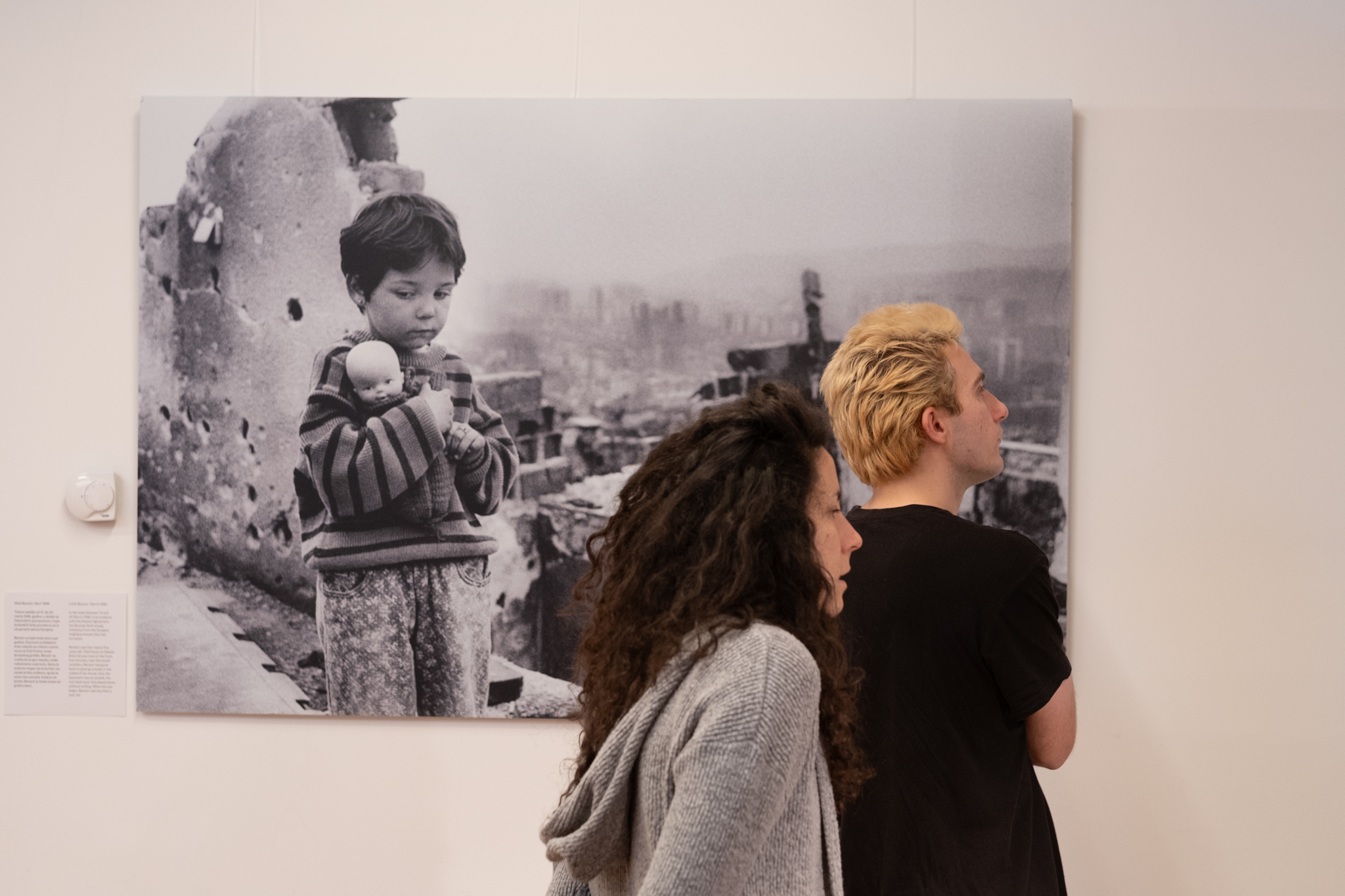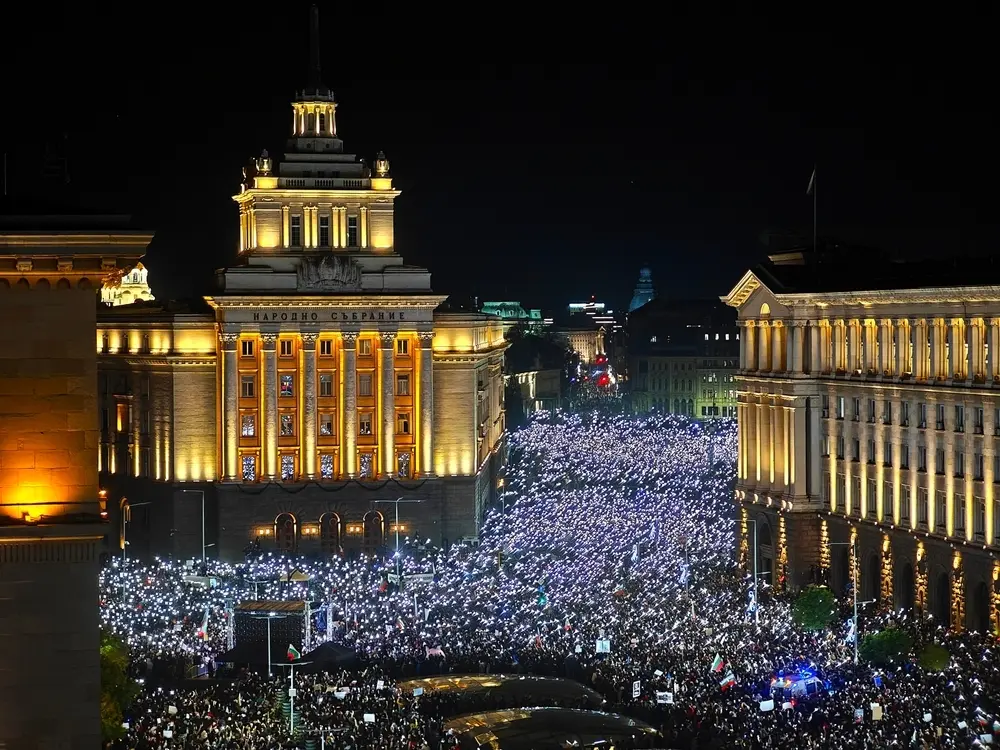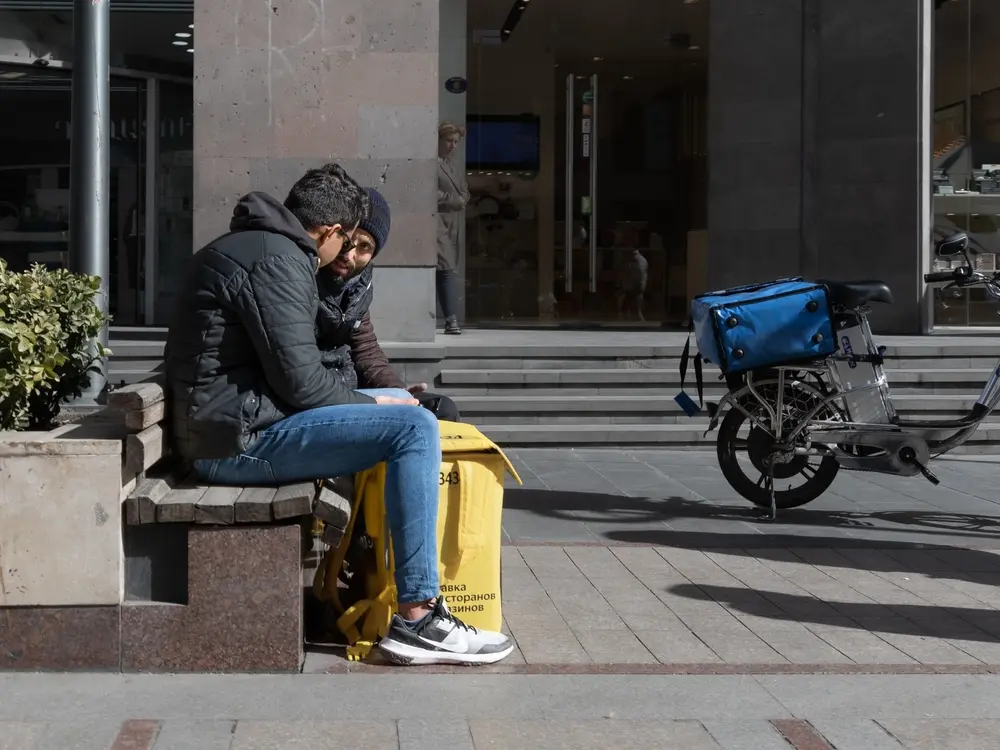Bulgaria: senza visto e senza esodo
A partire dallo scorso maggio i cittadini bulgari non hanno bisogno di visto per entrare nei Paesi Schengen. Tanya Mangalakova, nostra corrispondente da Sofia, in questo suo reportage inizia ad illustrarne alcune conseguenze. Il testo è in inglese.
Since 24 May 2001 Bulgarians have been travelling to the countries from EU without visas. It has been an year and a half since Bulgarians have not been queuing the consulate offices of the EU countries and have enjoyed the opportunity to embark on an improvised travel, making hotel reservations and boarding the plane or the bus at the last moment holding only a valid international passport and enough cash.
Before the Shengen visas were lifted up, many expected that plagued by unemployment and the hard economic crisis ravishing the country, Bulgarians will emigrate to Western Europe and only pensioners will stay in Bulgaria. In November, on a press conference Mr. Boyko Kotsev, Deputy-minister of the Ministry of the Interior, confessed that the prognoses of the Ministry about a huge wave of Bulgarian economic migrants to Western Europe did not take place. However, an year and a half after the fall of the "Berlin war", the Bulgarian authorities were faced with many problems related to the phenomenon of Bulgarian migrant workers to the EU.
Deported Bulgarians
Border Police data reveal that 4078 Bulgarians, residing illegally in the Shengen countries, have been repatriated to Bulgaria by force from the beginning of 2002 till October 2002. 1055 Bulgarians have been deported from Germany, 856 – from the Netherlands, 758 – from Belgium, 383 – from Poland, 190 – from Italy, 131 – from Austria,124 – from Norway, 103 – from France, 98 – from Great Britain, 76 – from Greece and 309 – from other countries.
Netherlands attracts many Bulgarians to migrate in search for income. It has been estimated that it hosts around 160,000 illegal migrants, 5,000 of which are Bulgarians, reports the Sega daily in its 14 November 2002 edition in an article about the 122 Bulgarians deported from France and the Netherlands. Some of them have been registered for crimes committed in Bulgaria. Bulgarian males would usually find employment in Holland as painters, while females would work as cleaning ladies and house servants. Ani from the town of Shumen recounts in front of Sega that she her daily wage in the Netherlands amounted to her monthly payment in Bulgaria.
About 150 illegal Bulgarian immigrants were deported from the Amsterdam police on 27 November. According to preliminary information from the Dutch authorities, the deportees were sent back for expired visas, illegal work or prostitution. "We will find another way to escape and return. We have no intention to stay back home. In a report from the Sofia airport on 28 November 2002 Sega refers to the words of a young Roma woman from the town of Razgrad, "There is nothing to eat here. The Bulgarians that come to the Netherlands say that they are starved to death. In the Netherlands they stop you on the street and offer you food, while back here, when they see that you are Roma, they do not give you any job". At Sofia airport the deportees were stripped of their foreign passports and banned to leave the country for one year.
"We face a serious danger that some European countries re-introduce visas for Bulgarians", Mr. Solomon Passy, Foreign Minister, was quoted by the Bulgarian press. The danger turned out to be exaggerated. Despite this, the government reacted by adopting at the beginning of December 2002 a 2-years prohibition to leave the country for those Bulgarian citizens who breached foreign laws. This measure can be introduced not only after obtaining an official letter at the Ministry of Foreign Affairs but also based on the documents for expulsion or a forceful eviction from a foreign state. Surprisingly, the Cabinet reintroduced the so called official passport well-known from the Socialist era. State officials are to travel abroad with special green-coloured passports, read the amendments to the Identity Documents Act. The press commented on the government’s decision to introduce official passports. Sega comments this would create a small group, which would continue to live under the conditions of Socialism. 24 Chassa comments that official passports will further destabilise the positions of the ones in power. Why should they be introduced, if the Schengen curtain is not expected to fall down again, asks the daily.
The economic migrants phenomenon
Bulgarians did not enjoy the freedom to travel during the era of Communism and after 1989 we have witnessed a tremendous migrants’ wave for mainly economic reasons. Predominantly young specialists are the ones to migrate and that is the reason this trend has been called brain drain. National Statistics Institute data, published in the dailies on 19 August 2002, indicate that 754 000 Bulgarians intend to emigrate or are seriously contemplating this possibility. This share represents 15% of all Bulgarian citizens aged 15 to 60. Mr. Iordan Kalchev, head of department "Demography" at the National Statistics Institute, explains on a round table on the brain drain phenomenon at the Agency for the Bulgarians Abroad, that yearly Bulgaria is losing 55-60,000 of its population. Bulgarians leave their county of origin in search for better livelihood in the developed European states.
Bulgarian migrant workers support their families in Bulgaria. "Bulgarians received 800 ml leva (about 412,371 ml Euro) illegally", reports the Monitor in its 2 December edition, quoting data from a research, carried out by the Social Democratic Institute and the "Friedrich Ebert" Foundation. 800 million leva entered the country unofficially and were sent by Bulgarians living abroad to their relatives. 26, 3 % from all Bulgarian households have relatives abroad, 600,000 people receive money from abroad sporadically and 300,000 people rely on their relatives living abroad for more serious amounts of money.
Driven by unemployment and the economic crisis at home, many Bulgarians, residing mainly in the countryside, resort to their right of a 3-month legal stay in the EU countries, to find employment, often as illegal workers. The Netherlands, Belgium and Germany have been complaining most from illegal immigrants from Bulgaria. Not all Bulgarian migrant workers, however, are illegal. Until presently, Bulgaria has signed more than ten agreements, entitling Bulgarians to work abroad legally in particular sectors of the economy in Western European countries. Such agreements have been signed with Germany, Switzerland, Portugal, Spain, the Czech Republic and Greece. These are the countries that are most preferred by the migrant workers.
The trend for Bulgarian economical immigrants is that young well-educated people are leaving Bulgaria and they find better social realization abroad in developed Western countries.
Houses in the Rhodopes are being built with Green Cards
"In the village of Kochan, situated in the Rhodope mountains, 95% of the population is applying for green cards", reports the 24 Chassa daily in its 5 December 2002 edition. One in ten of the 3,600 people residing in the village has left for abroad. The preferable destinations are the USA, Portugal and Spain. Lots of houses, called American ones, are being build in this place. The inhabitants of Kochan live quite well due to the regular transfers from their relatives, working in the USA. The colony of Kochan residents in the USA has already sent several times 500 USD donations for the village (Kochan is populated by Bulgarian Muslims). The village boasts a few Internet cafes, which are always crowded because people are willing to keep regular touch with their relatives.
The Bulgarian ghetto in the vicinity of Milano
The Bulgarian Consulate Office in Rome claims that the Bulgarians holding a permesso to work in Italy are 7,399 and it is expected that their number will continue to rise. Unofficial data indicate that solely in Milano there are around 200,000 Bulgarians, mostly from the countryside. The 168 Chassa weekly in its 8-14 March 2002 edition comes up with a shocking report about the misery, in which Bulgarian migrant workers live, "The Bulgarians in Italy – a life in cardboxes". In the neighbourhoods of Milano, not far from a waste recycling plant, there is a cafeteria, where several times weekly buses dump the next portion of Bulgarians, who have embarked on the search after money and luck in the rich Italian North. Most Bulgarian migrants live in a ghetto, which they themselves call the village of Barakovo (Sheds’ Village) or the village of Bokluk (Garbage Village). They have built houses made of cardbox, covered with nylon and reside amidst a pile of garbage and intolerable reek. The ghetto was founded ten years ago by the first Bulgarian migrants to Milano. The Italian police has tolerated the homeless, since they have caused no problems. In the most luxurious shed there are to be found three iron beds, a table, and a freezer, despite the fact that there is no electricity in the village. Dimitar from the town of Sapareva bany explains that he lives with his parents. He and his mother work in a printing factory for wrapping papers and magazines. They both possess legal documents but are unwilling to pay rent because that is very expensive. "We see no chance that we come back to Bulgaria. Even if we do so, what are we going to do, since the factories do not work and out families rely on us and live on what we send them?", says Dimitar.
Most Bulgarian economic migrants in Italy do not possess legal documents and do not hold permanent jobs. The highest payments is offered in the sectors of chemical production, construction, brick-building and mosaic laying. Women mostly take care of elderly people or small kids. With their odd jobs Bulgarian migrant workers manage to make a living and even send money to their families. The daily payment rate on the black labour market in Milano can reach up to 120 leva but it usually varies between 80 and 100 leva. "When are we going to earn that much at home", is how Bulgarian men explain why they prefer the Italian misery to the unemployment they face at home.
In evidenza
- Partecipa al sondaggio












